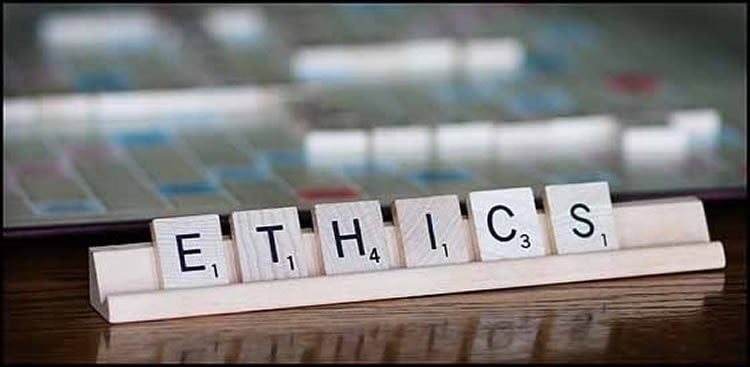Anticipating temptation may improve ethical behavior, a new study finds.
Honest behavior is much like sticking to a diet. When facing an ethical dilemma, being aware of the temptation before it happens and thinking about the long-term consequences of misbehaving could help more people do the right thing, according to a new study.
The study, “Anticipating and Resisting the Temptation to Behave Unethically,” by University of Chicago Booth School of Business Behavioral Science and Marketing Professor Ayelet Fishbach and Rutgers Business School Assistant Professor Oliver J. Sheldon, was recently published in the Personality and Social Psychology Bulletin. It is the first study to test how the two separate factors of identifying an ethical conflict and preemptively exercising self-control interact in shaping ethical decision-making.
In a series of experiments that included common ethical dilemmas, such as calling in sick to work and negotiating a home sale, the researchers found that two factors together promoted ethical behavior: Participants who identified a potential ethical dilemma as connected to other similar incidents and who also anticipated the temptation to act unethically were more likely to behave honestly than participants who did not.
“Unethical behavior is rampant across various domains ranging from business and politics to education and sports,” said Fishbach. “Organizations seeking to improve ethical behavior can do so by helping people recognize the cumulative impact of unethical acts and by providing warning cues for upcoming temptation.”
In one experiment, business school students were divided into pairs as brokers for the buyer and seller of a historic New York brownstone. The dilemma: The seller wanted to preserve the property while the buyer wanted to demolish it and build a hotel. The brokers for the seller were told to only sell to a buyer who would save the brownstone, while the brokers for the buyer were told to conceal the buyer’s plan to develop a hotel.
Before the negotiations began, half of the students were asked to recall a time when they cheated or bent the rules to get ahead. Only 45 percent of those students thinking about their ethics ahead of time behaved unethically in the negotiations, while more than two-thirds, or 67 percent, of the students who weren’t reminded of an ethical temptation in advance, lied in the negotiations in order to close the deal.
In another experiment involving workplace scenarios, participants were less likely to say it is okay to steal office supplies, call into work sick when they aren’t really ill, or intentionally work slowly to avoid additional tasks, if they anticipated an ethical dilemma through a writing exercise in advance and if they considered a series of six ethical dilemmas all at once.

In other words, people are more likely to engage in unethical behavior if they believe the act is an isolated incident and if they don’t think about it ahead of time.
The results of the experiments have the potential to help policy makers, educators and employers devise strategies to encourage people to behave ethically. For example, a manager could control costs by emailing employees before a work trip to warn them against the temptation to inflate expenses. The notice could be even more effective if the manager reminded employees that the urge to exaggerate expenses is a temptation they will encounter repeatedly in the future.
Source: Susan Guibert – University of Chicago
Image Source: Image is credited to Orietta.sberla and is licensed Creative Commons Attribution-Share Alike 3.0 Unported
Original Research: Abstract for “Anticipating and Resisting the Temptation to Behave Unethically” by Oliver J. Sheldon and Ayelet Fishbach in Personality and Social Psychology Bulletin. Published online May 22 2015 doi:10.1177/0146167215586196
The researchers have also made available full access to the research paper via this link (pdf)
Abstract
Anticipating and Resisting the Temptation to Behave Unethically
Ethical dilemmas pose a self-control conflict between pursuing immediate benefits through behaving dishonestly and pursuing long-term benefits through acts of honesty. Therefore, factors that facilitate self-control for other types of goals (e.g., health and financial) should also promote ethical behavior. Across four studies, we find support for this possibility. Specifically, we find that only under conditions that facilitate conflict identification—including the consideration of several decisions simultaneously (i.e., a broad decision frame) and perceived high connectedness to the future self—does anticipating a temptation to behave dishonestly in advance promote honesty. We demonstrate these interaction patterns between conflict identification and temptation anticipation in negotiation situations (Study 1), lab tasks (Study 2), and ethical dilemmas in the workplace (Studies 3-4). We conclude that identifying a self-control conflict and anticipating a temptation are two necessary preconditions for ethical decision making.
“Anticipating and Resisting the Temptation to Behave Unethically” by Oliver J. Sheldon and Ayelet Fishbach in Personality and Social Psychology Bulletin. Published online May 22 2015 doi:10.1177/0146167215586196






